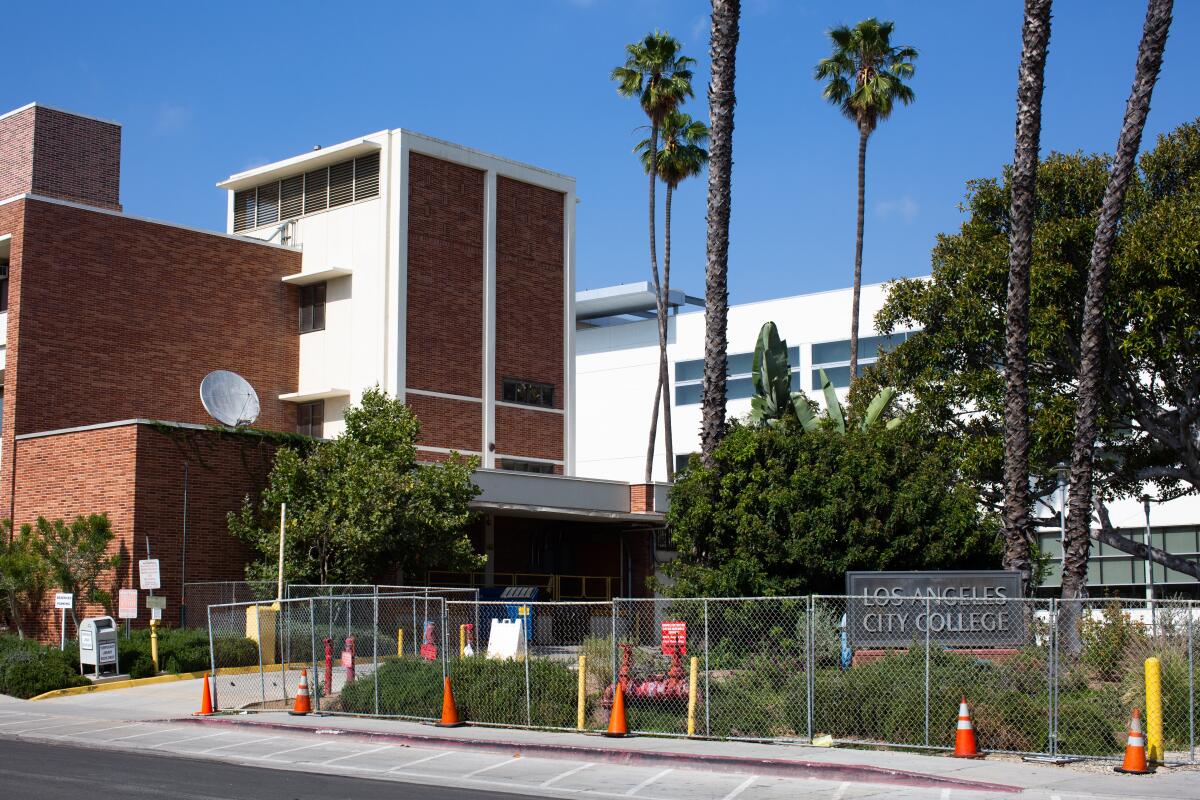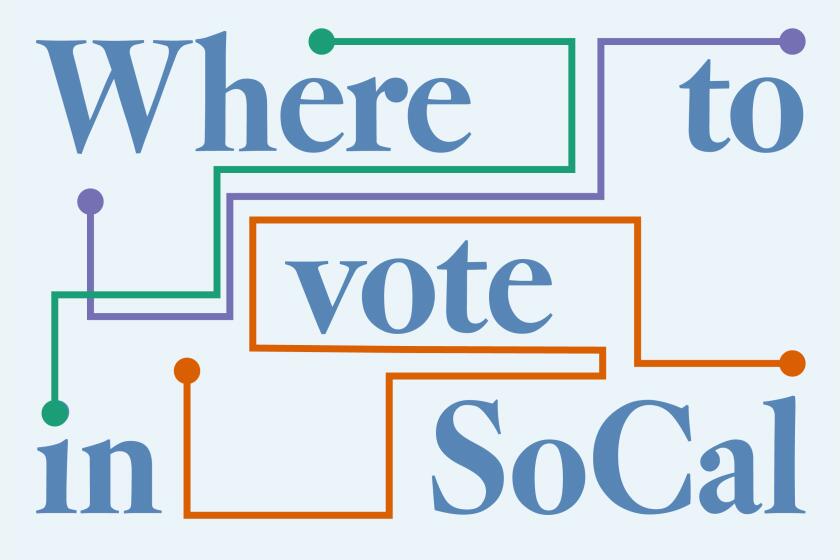Election of a board majority will shape the nation’s largest community college district

- Share via
With a dizzying 33 candidates, the election of four seats on the seven-member Los Angeles Community College District board has brought into focus the basic needs of some of the poorest college students in California amid the pandemic, as well as issues of declining enrollment, budget oversight and accountability over the chancellor.
Voters within a 900-square-mile area of Los Angeles County, from San Pedro to San Fernando and Malibu to Monterey Park, will choose whether to elect candidates backed by labor, newcomers marshaled by students, trustees who have run before, homeless advocates or others to oversee the nine-college system. Each seat is elected at large and there is no primary, just the general election.
“This is the largest community college district in the country,” said Fernando Guerra, professor of political science and director of the Center for the Study of Los Angeles at Loyola Marymount University. “It is oftentimes a trendsetter. If it takes on issues and is successful — whether it’s online education, whether it’s student housing, whether it’s certain standards — it will reverberate throughout California and the nation.”
These are among the issues the newly elected board will face:
Declining enrollment. Years in the making, the enrollment decline has been exacerbated by COVID-19, as students have struggled to complete classes online and faced economic uncertainties and other stressors at home. Districtwide enrollment this fall is down to 87% of where it was last year. State revenue is based largely on student enrollment.
Poor student outcomes. According to state data, out of roughly 120,000 students who enrolled at an LACCD college in 2017-18 with the goal of earning a two-year and/or four-year degree, about 14% completed 12 or more units in the fall, and only 4% completed transfer-level math and English within their first year — both important predictors of success. Just 8,000 students previously enrolled in a community college successfully transferred into a four-year institution the following year.
Student basic needs crisis. Before the pandemic, an estimated 62% of students in the LACCD were food-insecure and 55% were housing-insecure. COVID-19 has deepened those insecurities, and access to laptops and high-speed internet has also become a basic need, with an enormous digital divide.
Oversight of the chancellor. The election outcome will determine whether the LACCD’s chief administrator, Chancellor Francisco Rodriguez, stays or goes. In December the board voted 5 to 2 to renew his contract for just one year, to 2021. Board member Scott Svonkin, who voted no, said at the time that Rodriguez had done too little to counter the district’s declining enrollment and low graduation and transfer rates, allowed student information to be compromised with a broken IT system and failed to prevent mismanagement of funds.
Oversight of the bond program. Out of the district’s $5.4-billion budget for 2020-21, $3.9 billion is from voter-approved bond measures for building. After The Times ran a series detailing massive waste in the program, the district put in place a bond oversight monitor, but questions have persisted about how the money is being spent.
In one well-funded candidate group, current board President Andra Hoffman and incumbents David Vela and Mike Fong have been endorsed by the Los Angeles College Faculty Guild, the union that represents community college faculty members, and the L.A. County Democratic Party, as has newcomer Nichelle Henderson, a teacher at Cal State L.A.
Faculty guild President Joanne Waddell said Hoffman has been a successful board president and commended her for supporting child development centers and ensuring student workers continued to get paid after the pandemic hit.
Vela is a public affairs consultant who has worked for former L.A. County Supervisor Gloria Molina and former Assemblywoman Jackie Goldberg, who is now on the L.A. school board. He was appointed by the LACCD board in 2018 amid vigorous protests to fill the seat of Sydney Kamlager when she was elected to the state Assembly.
Fong, who has a background in workforce development, chairs the board’s committee on institutional effectiveness and student success and has earned a reputation as someone who tries to find and tread middle ground.
The guild is hoping that Henderson, a faculty advisor and lecturer in a teacher credentialing program, can garner enough votes to unseat Svonkin. “She is pro-public higher education, she is pro-labor, and she is pro-student,” Waddell said. She would also bring diversity to the trustees as a Black woman.
Svonkin, who has fought for transparency and accountability on the board, to the point of agitating other members, worked to reform the bond program and ensure a healthy financial reserve. With L.A. Mayor Eric Garcetti and other board members, he helped create L.A. College Promise, a free-tuition and support program for students from the Los Angeles Unified School District. Garcetti, Sen. Kamala Harris, and firefighters and nurses unions are among his backers.
Campaign finance records show that the guild and a committee tied to it spent $1.66 million in its bid to remove Svonkin and elect its four preferred candidates. Most of the money was spent on political mailers and phone banking.
“Faculty … are the most significant players in community college elections, and of course that’s problematic,” Guerra said. “They are selecting their bosses, which will determine their salaries and benefits.”
Another group of four candidates nicknamed the “LACCD Justice Squad” — Karen Hernandez, Ruffin Patterson, Cory Butler and Michelle Manos — were handpicked by student leaders to focus on student priorities: grants for basic needs, health services, culturally relevant support programs for Black and Latino students, and a rethinking of the campuses’ relationship with law enforcement.
Hernandez, an immigrant who has talked at candidate forums about her experience relying on food pantries as a child, earned a master of education degree at UCLA, crediting her start at L.A. Pierce College. Patterson, who grew up in South Los Angeles, is a high school teacher and athletic coach who also struggled to access adequate food, shelter and clothing. Butler, who was raised in South L.A., graduated from the University of Utah and served this summer as a site coordinator at a leadership program for high school students in the same public housing development where he grew up.
And Manos, a homeless services provider with the organization Shower of Hope, was recently arrested while protesting the police shooting of community college student Andres Guardado. She has been endorsed by the liberal group Americans for Democratic Action.
“We gathered a slate of grass-roots candidates who haven’t had a lot of political experience but who understand what’s at stake,” former student trustee and organizer Alfredo Gama said.
The Justice Squad has raised little money for political advertising, but it does have a small army of dedicated students and faculty members who are volunteering to text, call and leave fliers at voters’ homes, Gama said.
Others within the crowded field include Gerald Anderson, a business consultant and adjunct instructor at West L.A. College and L.A. City College; Anthony Danna, a senior vice president at Sony Pictures Television Networks; Cynthia Gonzalez, a high school principal who recently ran for a seat on the L.A. school board; Chris Han, a lawyer and adjunct instructor at L.A. Mission College; and Nancy Pearlman, a former longtime board member who has taught anthropology and communications in the LACCD system and was a staunch advocate of the district’s bond program.
The full list of names can be found beginning on page 92 of the final list of qualified candidates, available on the website of the L.A. County registrar-recorder’s office.
More to Read
Sign up for Essential California
The most important California stories and recommendations in your inbox every morning.
You may occasionally receive promotional content from the Los Angeles Times.















